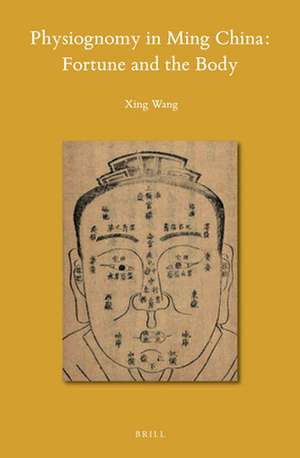Physiognomy in Ming China: Fortune and the Body: Sinica Leidensia, cartea 149
Autor Xing Wangen Limba Engleză Hardback – 18 mar 2020
Din seria Sinica Leidensia
- 18%
 Preț: 1037.13 lei
Preț: 1037.13 lei - 18%
 Preț: 902.42 lei
Preț: 902.42 lei - 18%
 Preț: 713.16 lei
Preț: 713.16 lei - 18%
 Preț: 633.42 lei
Preț: 633.42 lei - 18%
 Preț: 872.96 lei
Preț: 872.96 lei - 18%
 Preț: 622.50 lei
Preț: 622.50 lei - 18%
 Preț: 585.95 lei
Preț: 585.95 lei - 18%
 Preț: 868.32 lei
Preț: 868.32 lei - 18%
 Preț: 685.21 lei
Preț: 685.21 lei - 18%
 Preț: 1358.39 lei
Preț: 1358.39 lei - 18%
 Preț: 717.20 lei
Preț: 717.20 lei - 18%
 Preț: 725.17 lei
Preț: 725.17 lei - 18%
 Preț: 579.19 lei
Preț: 579.19 lei - 18%
 Preț: 596.62 lei
Preț: 596.62 lei - 18%
 Preț: 863.70 lei
Preț: 863.70 lei - 18%
 Preț: 1218.12 lei
Preț: 1218.12 lei - 18%
 Preț: 630.84 lei
Preț: 630.84 lei - 18%
 Preț: 777.25 lei
Preț: 777.25 lei - 18%
 Preț: 601.94 lei
Preț: 601.94 lei - 18%
 Preț: 636.88 lei
Preț: 636.88 lei - 28%
 Preț: 1692.21 lei
Preț: 1692.21 lei - 18%
 Preț: 729.06 lei
Preț: 729.06 lei - 18%
 Preț: 920.41 lei
Preț: 920.41 lei - 18%
 Preț: 1262.84 lei
Preț: 1262.84 lei - 18%
 Preț: 546.41 lei
Preț: 546.41 lei -
 Preț: 329.79 lei
Preț: 329.79 lei - 18%
 Preț: 821.93 lei
Preț: 821.93 lei - 18%
 Preț: 547.56 lei
Preț: 547.56 lei -
 Preț: 336.47 lei
Preț: 336.47 lei - 18%
 Preț: 691.89 lei
Preț: 691.89 lei - 18%
 Preț: 1061.32 lei
Preț: 1061.32 lei - 18%
 Preț: 731.40 lei
Preț: 731.40 lei - 18%
 Preț: 521.30 lei
Preț: 521.30 lei - 18%
 Preț: 823.08 lei
Preț: 823.08 lei - 18%
 Preț: 758.99 lei
Preț: 758.99 lei - 18%
 Preț: 610.43 lei
Preț: 610.43 lei - 18%
 Preț: 763.69 lei
Preț: 763.69 lei - 15%
 Preț: 518.15 lei
Preț: 518.15 lei -
 Preț: 262.02 lei
Preț: 262.02 lei - 18%
 Preț: 937.18 lei
Preț: 937.18 lei - 18%
 Preț: 635.15 lei
Preț: 635.15 lei - 18%
 Preț: 585.70 lei
Preț: 585.70 lei - 15%
 Preț: 530.26 lei
Preț: 530.26 lei - 18%
 Preț: 659.86 lei
Preț: 659.86 lei - 15%
 Preț: 525.15 lei
Preț: 525.15 lei - 18%
 Preț: 579.34 lei
Preț: 579.34 lei - 15%
 Preț: 520.24 lei
Preț: 520.24 lei - 18%
 Preț: 536.28 lei
Preț: 536.28 lei - 18%
 Preț: 705.05 lei
Preț: 705.05 lei
Preț: 578.89 lei
Preț vechi: 705.96 lei
-18% Nou
Puncte Express: 868
Preț estimativ în valută:
110.79€ • 115.23$ • 91.46£
110.79€ • 115.23$ • 91.46£
Carte indisponibilă temporar
Doresc să fiu notificat când acest titlu va fi disponibil:
Se trimite...
Preluare comenzi: 021 569.72.76
Specificații
ISBN-13: 9789004429543
ISBN-10: 9004429549
Dimensiuni: 155 x 235 mm
Greutate: 0.64 kg
Editura: Brill
Colecția Brill
Seria Sinica Leidensia
ISBN-10: 9004429549
Dimensiuni: 155 x 235 mm
Greutate: 0.64 kg
Editura: Brill
Colecția Brill
Seria Sinica Leidensia
Notă biografică
Xing Wang obtained his DPhil from the University of Oxford in 2018. He is a Junior Research Fellow at Fudan University in Shanghai, and specializes in the study of Chinese divination and Chinese Buddhism
Recenzii
"This volume would be of immense use to those interested in Chinese religion. On a much broader level, this volume has the potential to be of immense use to those interested in general divination practices. In Wang’s own words, the understanding one will gain from this volume will “allowus to re- examine other kinds of techniques that have existed in different religions and social communities, as well as look at how religion, divination, and popular cultivation are techniques central to human life.”
– Joseph Chadwin, University of Vienna, Religious Studies Review 47/3 (2021).
– Joseph Chadwin, University of Vienna, Religious Studies Review 47/3 (2021).
